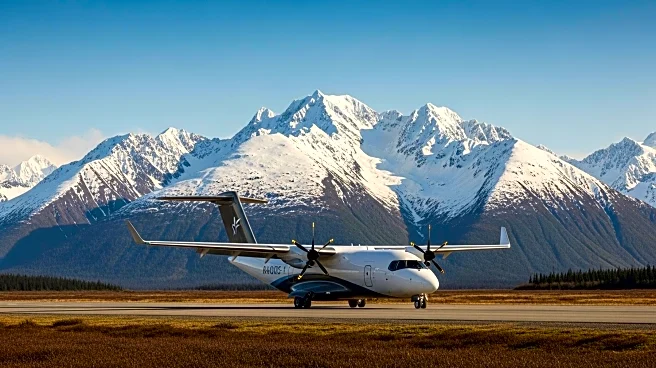What's Happening?
Ryan Air, a cargo airline based in Alaska, has placed an order for an electric plane from BETA Technologies, marking a significant step towards sustainable aviation. The aircraft, known as the Alia CTOL, is designed to carry up to 1,250 pounds of cargo and operate under instrument flight rules, even in known icing conditions. This capability is crucial for safe operations in Alaska's severe weather. The Alia CTOL features a proprietary H500A electric motor and Hartzell propellers, achieving a range of 336 nautical miles and a maximum speed of 153 knots. Ryan Air plans to use the aircraft to deliver essential goods such as food and medicine to over 70 rural communities in Alaska, many of which are inaccessible by road.
Why It's Important?
The introduction of electric aircraft by Ryan Air represents a pivotal shift towards reducing carbon emissions in aviation, particularly in remote areas like Alaska. This move not only supports environmental sustainability but also enhances the reliability and efficiency of cargo delivery in regions dependent on air transport. By installing up to ten BETA Charge Cubes, Ryan Air aims to support the operation of electric aircraft and other electric vehicles, potentially reducing reliance on diesel generation in rural areas. This development could pave the way for broader adoption of electric aviation technology, influencing industry standards and encouraging other airlines to consider similar sustainable practices.
What's Next?
Ryan Air's commitment to electric aviation may prompt other cargo and passenger airlines to explore similar technologies, especially in regions with challenging weather conditions. The installation of BETA Charge Cubes could lead to increased infrastructure development for electric vehicles in Alaska, potentially influencing local energy policies. As electric aircraft technology advances, stakeholders in the aviation industry may need to address regulatory and logistical challenges associated with integrating electric planes into existing fleets. The success of Ryan Air's initiative could serve as a model for other airlines looking to reduce their environmental impact.
Beyond the Headlines
The adoption of electric aircraft by Ryan Air highlights the growing importance of sustainable practices in aviation, which could lead to long-term shifts in industry standards. This development raises ethical considerations regarding the balance between technological advancement and environmental stewardship. As electric aviation becomes more prevalent, there may be increased scrutiny on the lifecycle impact of battery production and disposal. Additionally, the success of electric planes in Alaska could influence cultural perceptions of aviation, encouraging a broader acceptance of electric vehicles in other sectors.









